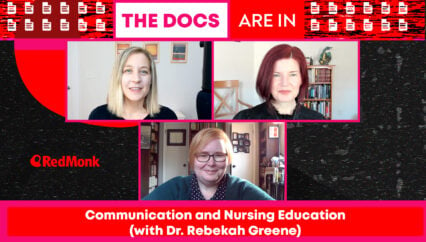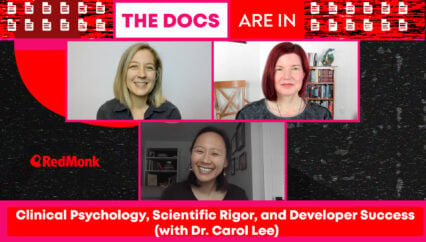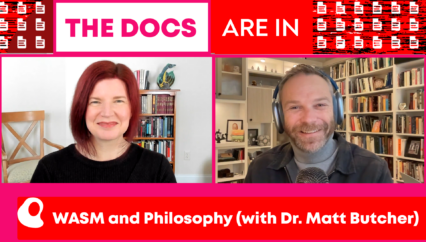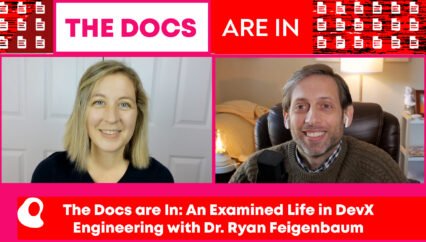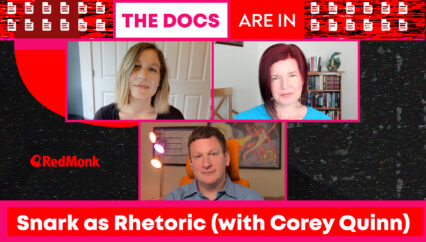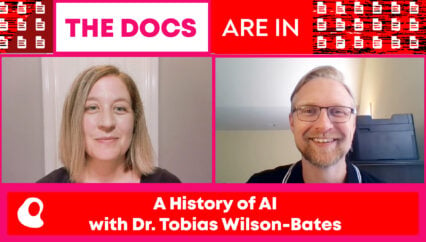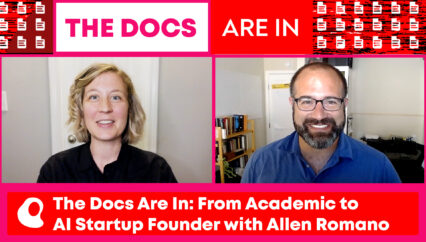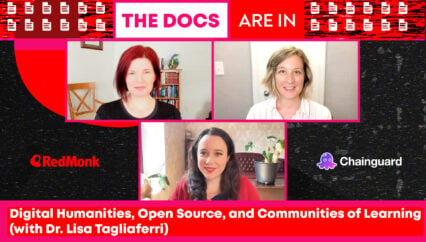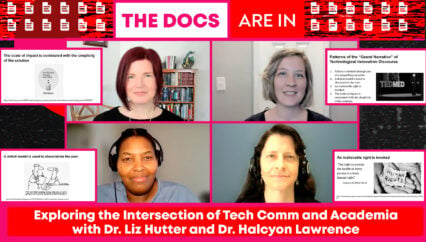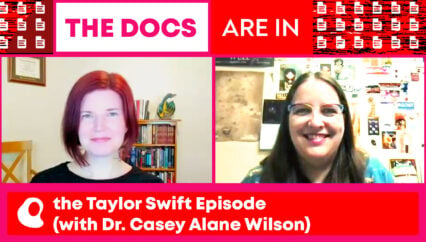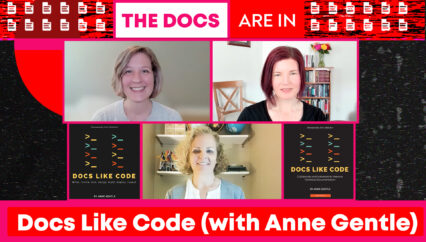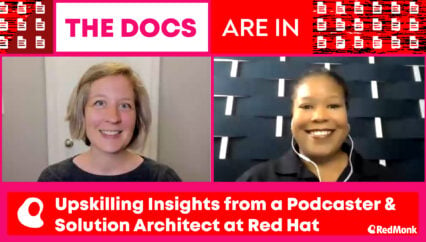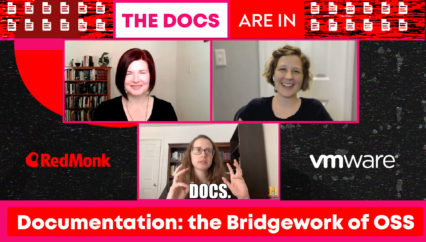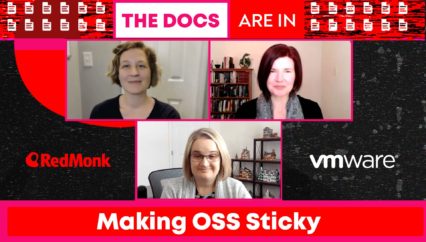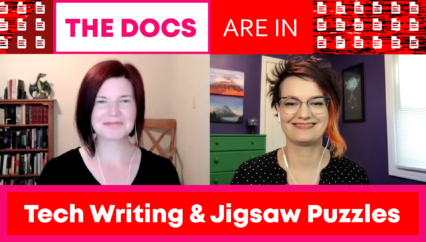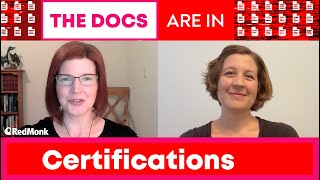For this episode of The Docs are In, Dr. Eli Thorkelson, software development engineer at Workday, catches up with Dr. Kate Holterhoff, analyst with RedMonk.
Related Resources:
- Decasia (Dr. Thorkelson’s blog)
- R.I.P. My Academic Career
This was a RedMonk video and was not commissioned by any entity.
Rather listen to this conversation as a podcast?
Transcript
Kate Holterhoff: It is my pleasure to welcome Dr. Eli Thorkelson to this episode of The Docs are In, the RedMonk series where we discuss topics relating to docs, documentation, doctorates, academia, upskilling, and of course, how all of these ideas relate to tech. My name is Kate Holterhoff and with me today is Eli, a software development engineer at Workday with an anthropology PhD. She and I also worked together on an engineering team at a digital marketing agency in Atlanta, which was, what, a seven person team. And somehow two of us had doctorates. What are the odds? So this was my first job after leaving academia, which means that this conversation is going to be particularly exciting for me since we share this experience of not only being an academic in the tech realm, but also serving on an interactive team together. So welcome, Eli.
Dr. Eli Thorkelson: Thank you. Thanks for having me.
Kate: All right. So let’s begin by just talking a little bit about your background. What was your journey into tech like? Can you tell us a little bit about your history?
Eli: Yeah, I was a teenager in the 90s, at a time when there was a lot of early Internet culture happening and a lot of programming nerd culture happening, which I loved. And I was really into that stuff as a teenager, but I really didn’t like computer science, formal education. I didn’t really find it — I wouldn’t say it was an unfriendly environment, but I just didn’t find it a hospitable environment. And I didn’t find that it answered questions about the reason why we exist and our social and psychological questions about existence in a way that I was looking for when I was 18 or 20 years old. So didn’t get any degrees in computer science. And I found out pretty quickly — I think I was 19 the first time someone paid me money to write code and I kind of said to myself, I don’t need to study CS indefinitely since the jobs are kind of there already if you’re able to produce working software, which is something that, you know, is a skill that’s been in demand for a while in the economy. And so I didn’t do programming professionally for quite a while after. I had part time student jobs in software for a while and then went to graduate school, didn’t do any programming for years, and I went back to it eventually, in a university office again, first as a part time student programmer in a Humanities IT office. And then after I had been there a year, the full time person who did Ruby on Rails left to go work in a startup.
Eli: It’s 2012 and they said, basically, “Do you want this job? You’d be good at it. Come work for us full time.” So I hadn’t completely finished my dissertation, but I took this job, which was the first time I had ever worked 40 hours in an office, which was quite an experience if you’re not used to it. And it was really nice. I had really brilliant colleagues and a lot of scope for exploration, and we were building internal web applications for — imagine you’re trying to keep track of endowments or where the students are in a humanities program or something like this. So we’re just building internal software that does that. And I stayed there for a while, I think about four years or something like this. And I finished my dissertation at night. It was this crazy thing where I would work until five and then I would go to a coffee shop and have like extra coffee and write until about eight and then have dinner and crash and then just rinse and repeat. And then I kind of bounced around academia for a few years, I had a Postdoc, I had a teaching job. In the end it was impossible to — I didn’t find that academic careers were hospitable. I found that jobs were really hard to come by and in weird places, and it just turned out to be compatible with life, to stick with software and not to stick with academia.
Kate: Yeah, I mean, obviously that resonates deeply with my own experience. Only I, you know, got my PhD in literary and cultural studies and did the Postdoc thing for a while. But I think what really compels me about your story is that it really touches on the ways that our academic background resonates with what we continue to do. And so I love the fact that you used working in software development at a university as a jumping off point because that’s sort of like the soft way of leaving. I know a lot of folks who wanted to get out of the academy entirely. They wanted to completely sever ties and not look back. But I think that your experience there, it sounds like it was it was a positive way of transitioning out of the academic realm and coming to terms with the fact that you weren’t going to continue there. Am I off base or does that kind of resonate?
Eli: I mean, I think that it definitely made — I mean, there is a huge difference between doing something as a student job and doing it all day as your professional identity and I feel like you have to try that to figure out whether it can be livable for you. You couldn’t really just guess, “does that sound good” or I mean, you can guess all you like? But it helps to really be there and see what is actually happening just in the day to day life of a workplace. And I think that yeah, I think where I’ve worked — I mean, it’s interesting because it was an IT department, and IT organizations are really culturally different than a software company, like a tech company. Or even the agency context that we’ve met in IT organizations, exist to serve some specific needs of some big organization — or small — but in my case, big. And they don’t bring in money or generate what we would call in the private sector business -value- all by themselves. They just are a support function and they’re really interested in things like maintenance and maintainability and long term planning in a really different way than the very short term horizons of a lot of the private sector technology firms. And so I felt like I absorbed a lot of professional wisdom from being in an IT place and seeing that, maybe we should, in some circumstances at least plan ten years down the line and try and make sure that what we’re building today isn’t going to destroy itself tomorrow because of some future condition that we could have anticipated.
Kate: So I think, you know, another thing that really was interesting to me while we were working together on that interactive team was that you had mentioned the binders of documentation that you had encountered there. And, you know, we were just beginning to create a more robust wiki. And so I was very interested in this idea of having physical copies of the documentation that you’re ostensibly supposed to read through before making any grand changes. Do you think that’s something that we’re still seeing, or do you think that was just sort of a vestige of an older tried way of doing things?
Eli: Yeah. I don’t really have a very clear theory of what the direction of documentation is supposed to be. I think in some ways I do feel like it has not changed hugely in the last decade. People use wikis the same way as they used to. I think that full-text searching has in general gotten better and that has taken some of the pressure off people who wanted to otherwise — you know how classifying everything in some perfect librarian-esque classification system is really hard and really time consuming, and putting everything in the right place is really hard? I think that some of the pressure to do that has gone away now that it’s possible to kind of arrange things in a sloppier way and find them with text search like keyword type search in a better way than when this all kind of — then when I first started working in these kinds of things. But I don’t know what the direction of documentation is. I will tell you that I search in Slack history just as much as I search anywhere else for documentation.
Kate: I doubt you’re alone in using that in your tool chain. Okay. Well, another question that I’m hoping that we can address is, do you have any other lessons from your time in academia that you see extending to your current work? Is there, you know, is it something that you have completely in the back burner or are there certain ways of doing things or ways of seeing the world or skills that you learned in your time studying for your PhD and sort of considering continuing in that vein of work that still resonates, that maybe you do differently than some of your peers who don’t have this long academic tenure?
Eli: I think that what you get out of doing a PhD in social research like in Ethnography or something like I have, is that you prioritize relationships and communication. And let’s be honest, that is something that is a variable interest to professional technology people. And so I do find it useful. I think that it’s useful to have been really steeped in — I mean culture theory, but also just in a more intuitive way. Let’s ask when people seem to be at odds with each other or miscommunicating, what are their presuppositions that cause them to be in that state of non-mutual understanding? Whereas sometimes, you know, people may not always interpret that in contextual ways like that. So I do feel like there is something useful about that. Not planned, totally by accident, because I certainly didn’t get a doctorate planning to work in a large technology company. So any skills that are transferable are fortuitous. I guess you could put it that way. Writing, you know, turns out to be really useful, like being able to write well. I think that clear and precise writing is a really, really useful skill.
Kate: Well, that’s a great segue, actually, because I was actually hoping to talk a little bit about this wonderful post that you have on your blog, Decasia, which was that just an academic blog or do you consider it Decasia to be a sort of professional blog?
Eli: I think it’s an archive. I started a different one about software stuff.
Kate: Oh, great. Okay. Well, we will link to that for sure. Well, in Decasia you do have this wonderful post about the process of un-becoming an anthropologist. Would you talk to us a little bit about what that piece is about and what drove you to feel the need to write it?
Eli: I mean, I do feel like there’s a lot of loss in investing 10 or 15 years of your life in an academic field and then detaching yourself from it. Nobody has a good theory of how to do that that have ever come across. And there’s a lot of rationalization like, oh, I was meant to do this. I was meant to not end up in my tenure track job or I was — just a lot of mythmaking. I think about the fundamentally, really arbitrary ways people move around in the economy and thrive absolutely are excluded from different kinds of economic circumstances like stable academic employment. That having been the obvious goal of graduate school in the way that it was originally taught to me for sure. And so I wrote about leaving anthropology just because… yeah, I felt like some kind of mourning process was required and you have to go through the list of things that you’re not or — whether or not you think of them as a list — but you have to go through the things you’re not going to do anymore. And I turned down review requests — like uncompensated, unpleasant review requests from journals for a couple of years until they stopped asking, which was, I guess, nice. And would always send to them the same reply that would say like, “I’m no longer working in academia and I cannot do a compensated review labor for you anymore. Sorry.” Anyway, I tried to write about letting go of all those different kinds of things, but my partner at the time that Iwrote that piece said, “this is funny because it’s still really very academic writing.” I think that was also true.
Kate: Right. Yeah. I think there certainly is a genre about Quit Lit, but your piece in particular, it does have that sort of tone of sadness to it, which you don’t always see. Some folks get very, you know, the anger comes across or the blame. But for you it was kind of an elegy. But I think what kind of extends that — the sadness that comes through in that piece, which I do find so compelling and I recommend everyone read — is that you created this wonderful app called RIP My Academic Career. And it is, well, actually, why don’t you tell us what it is?
Eli: I mean, RIP My Academic Career, which I guess we should share the screenshot of —
Kate: Oh absolutely, we will include one.
Eli: — is a graveyard for careers that didn’t work out in academia. And each time each person who cares to create a little marker for themselves can have a little virtual grave for the career with virtual flowers randomly generated on many of the bottoms of their virtual tombstones. And everyone can write their own epitaph, which I guess is democratic or something. It’s funny because it’s parody and it’s not, you know, like I don’t really — and I think that there was interest. There were some really aggressive spam on that will say, people trying to attack other posters which I tried to moderate. And so I won’t say that people only used it in healthy ways, but for the most part I think that it seemed like it found its audience who felt peace with it.
Kate: How many folks do you know — non spam non bot individuals –created a tombstone?
Eli: You know, I want to say like 100 and something, but I haven’t counted lately.
Kate: Well, it is genius parody in my mind. It really taps into that notion that your career is such a deep part of your identity, you know? And I think that’s always been the case across the board. But academics in particular, at least I’ve seen that they really invest their their entire selves into, you know, who they are as an academic. And so there really is a death that needs to be mourned when you opt to leave, no matter how it manifests emotionally. And it also just seemed like this wonderful use of your skill, your programming skills, to create this. I mean, so many folks I talk to who want to leave academia, they’re like, “well, what else can I do? I don’t have these –” You know, so it’s great that you have this fallback that you’re able to parody it in a meaningful way. I think I often get asked, “what is the through line with your career?” since I was painting murals in Cincinnati in my 20s. I went to art school, then went hard into the PhD for English, and then, now I’m an analyst, You know, where’s the through line? I feel like I have a much more difficult time trying to paint that. Whereas, you know, with this project in particular, it’s like, there it is, right? You know, right out of the open. You created the app that just articulates perfectly what it is that that academics go through, especially ones who transition into tech like you and I have.
Eli: Yeah. I think that after you have been in tech for a certain number of years, people kind of stop asking you about how you transitioned out of academia. And I actually haven’t really been asked that in some time because it’s like, after you have maybe more than about three years of experience or something, it starts to just be taken for granted that like, okay, this is your profession, whether or not it’s your identity. And will say that one of the things that died very, very durably for me in leaving academia was the possibility that I would ever, ever again identify myself so closely with my professional activities. I mean, not that I don’t enjoy my profession and practice it as well as possible and so on, but like, I just don’t think of it as being coextensive with me in the way that I used to think of academia as being coextensive with me. And that’s lightening, to be honest. I feel like that’s nice and I definitely know academics that are not able to get to that point or maybe don’t want to get to that point, which is fine.
Kate: Yeah, I’ve had that experience too. I mean, I was even counseled to leave my PhD off of my resume because it would be alienating maybe to hiring managers. I don’t know. I didn’t have those three years of experience at the time, so maybe that was good advice. I don’t know.
Eli: Yeah, I mean, I feel really strongly that I had a very singular path through these things and aided by fortunate economic moments at the moments that I wanted to go into software and this kind of stuff. But I think my experience in general is that my employers rarely understand what my doctorate means or what it’s about. They’re not very interested in really what it was about. But I think that they kind of — they feel that there is some cachet, I think, in having this to your name. So I feel like in general it’s been a very — and I say this with no special attachment to this, but I feel like it has like a tiny amount of cachet in worlds where there are not a lot of people with doctorates. I wouldn’t leave it off your resume.
Kate: You wouldn’t leave it off. Okay. Well, that resonates. Could you give any advice to folks who are considering maybe leaving academia to take a position in tech or just, you know, considering doing something different with their their PhD and trying to seek employment outside of the academic world?
Eli: Yeah, that’s such a good question. And it has no general answer, I don’t think. I think that I would never advise someone to go to graduate school in an academic program without having in mind a career Plan B. So I guess my advice would be to start with people who are like 20 or 25 rather than 30 or 35 or wherever you position your professional life course. If you have just finished your PhD and you didn’t really have any other career plan and you’re wondering what to do, I really think it does help to try and transition through things that are in universities. It worked really well for me at least, to have university staff jobs, university admin jobs. They’re pretty friendly towards hiring academics in those jobs. They consider you kind of a known entity, I think, and I feel like the hiring conversation is relatively straightforward. And so in any case, I think that a route that is somewhat plausible is to try and do a thing like that for a few years and then then switch to non-university employment, kind of the way that — I mean this worked for me. I don’t really know whether it will work for everybody. I think that it can work in other kinds of areas besides software development though, like programming and grant stuff. I think there’s a range of things where having administrative jobs in higher education can then lead to other jobs in similar specialties outside of higher education.
Kate: Yeah, I mean, absolutely. You know, academics already have their foot in the door wherever they’re getting their PhD or at their place of employment. So I think that’s very sound advice and certainly resonates with a lot of the journeys that I’ve seen as well. Okay. Well, on that positive note, I want to thank Eli for coming on this episode of The Docs are In. I will include Eli’s contact information in the summary and with that, the docs are out.
